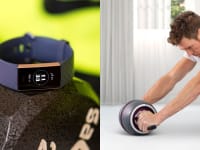5 expert tips for seniors to exercise safely at home
Find what fitness routine works best for you.
Products are chosen independently by our editors. Purchases made through our links may earn us a commission.
Fitness professionals agree: Any exercise is good exercise for seniors. And thanks to virtual options proliferating during the pandemic, there are more ways than ever for those aging in place to stay fit easily with little investment besides time and effort.
1. Create a safe environment
From yoga to weight training, setting up and storing equipment properly is essential, says Dr. Amy Lo of the Hinda and Arthur Marcus Institute for Aging Research. The Harvard Medical School instructor recommends that any senior exercise regime starts with walking—but because falls are one of the top hazards of aging in place, it’s important to eliminate any potential for trips and spills. Weather-proof mats both inside and outside a home’s threshold (along with designating a place to put wet and slippery shoes) are a must. Lo also says shoes with good tread and support should be tops on anyone’s equipment list.
The owners of Simply Fit & Fun say finding a well-lit, non-slip surface in one’s home is the first step to a great workout. The Massachusetts-based studio expanded its virtual live classes and playback options for at-home workouts suitable for all age groups during the pandemic. While many of their classes require minimal equipment (or common household items), having a designated storage space will prevent tripping on pilates balls or yoga mats, say Stefanie Sweeney and Danielle Ampolos.
2. There's no need to buy a lot of equipment
There are plenty of ways seniors can get a good workout at home with minimal equipment, says Cody Sipe, physical therapy professor and co-founder of the Functional Aging Institute. However, he does recommend a set of adjustable dumbbells.
“They’re easy to use and take up little space,” Sipe says. “People go out and buy the 3-pound weights, the 5-pound weights, and don’t progress beyond that because they have to buy another set. You want something so you can go beyond your current capabilities and have room to develop.”
The professor also recommends resistance bands or tubes. They’re “cheap, light, and portable,” he says. “Even high-level athletes use these.”
Resistance bands are used in some of Simply Fit’s routines, but the instructors often recommend a lot of DIY options, including using a dish towel in lieu of a band. “Or, if you don’t have weights, you can grab soup cans, or hold onto a countertop during barre or for stretching and balancing exercises. You can grab a lot of pillows and cushions and practice yoga and mindfulness,” says Ampolos. “Or, you can do a whole full-body workout using just a kitchen chair as resistance and support.”
3. Focus on strength and power exercises
Sipe and Lo agree—there’s a lot that can be accomplished with just a simple chair. Sipe's top recommendation is chair sit patterns, and he says seniors need to focus on lower body or whole body exercises versus upper body. “Strength and power that come from the larger muscle groups feed into functioning—balance, mobility, cognitive function, heart health," he says. "Traditional squat and lunge patterns, and deadlift patterns, are really good for older adults, and for everyone." Those types of exercises maintain or build the ability to climb stairs, get off the toilet, or stand from the floor, he says.
For seniors who may be less mobile, Lo recommends Tai Chi, as many of those exercises can be performed when sitting. “Any movement is good movement,” she says. “Whatever you do, you’re putting more money into your health bank.”
4. Mental health is just as important as physical well-being
Exercise can be just as beneficial for one’s physical health as their mental health and cognitive functioning, say the experts. To meet members’ needs for exercises that bridge the physical and emotional during the pandemic, Simply Fit & Fun started offering virtual mindfulness classes. Ampolos says the low-level yoga with stretching and meditation is suitable for any age.
Lo cited numerous studies showing a reduced risk for dementia and anxiety or depression among seniors who are more active, and recommended that those aging in place “find their fun.” “When you enjoy something, you’re more likely to stick with it,” she says.
Lo says that seniors with dogs to walk not only benefit from companionship, but the opportunity that comes with a commitment to get outside and exercise. Finding a partner to chat with during a stroll has emotional and physical benefits, she says, as research has shown that when seniors multitask—i.e., walk and talk—it’s more likely to sharpen their cognitive abilities. Lo is also a fan of activities that incorporate music, like dancing. “Music has been shown to improve mood—you can even just play some music in your kitchen and move to it,” she says.
5. There are high-tech and low-tech options for all abilities
A smart speaker makes it easy to play music via simple voice commands. Such assistive technology also includes options to set alarms for exercising or drinking water, and source workouts via a smart TV and YouTube, says Lo. Some seniors find motivation working out virtually with a celebrity or even their grandkids, she says.
But there are alternatives for even the least tech-savvy senior, according to Lo. Local senior centers often sponsor walking groups, and the SilverSneakers program includes free virtual and in-person classes through most Medicare plans.
The product experts at Reviewed have all your shopping needs covered. Follow Reviewed on Facebook, Twitter, Instagram, TikTok, or Flipboard for the latest deals, product reviews, and more.
Prices were accurate at the time this article was published but may change over time.


